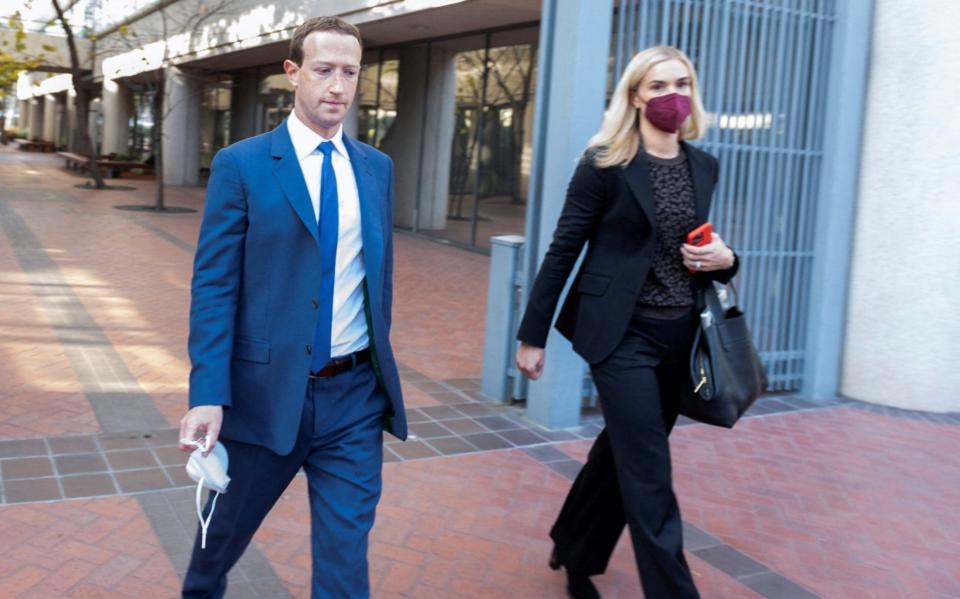Mark Zuckerberg announces $40bn share buyback at Meta after first revenue slump in history

Mark Zuckerberg has announced plans for a $40bn share buyback at his embattled social media group after the company posted its first ever drop in annual revenue.
Meta, which owns Facebook, Instagram and WhatsApp, said it would spend billions more buying up its own shares after a historic slump last year.
Over the last twelve months Meta has lost more than 50pc of its value, wiping around $200bn (£161.6bn) from its value. The slump came as revenue began to decline for the first time in the company’s history and investors grew increasingly sceptical of Mr Zuckerberg’s push to develop the so-called metaverse.
News of the buyback sent Meta’s shares surging more than 18pc in after-hours trading. Share buybacks reward investors by returning money to them while also helping to support share prices by reducing the amount of stock in circulation.
The rally for Meta came despite the company announcing the first drop in annual sales in its history. Meta’s sales shrank by 1pc last year, falling to $116.6bn.
Profits also slumped by 41pc to $23.2bn in 2022. Performance was hurt by a costly round of redundancies and continued heavy losses on Mr Zuckerberg’s metaverse bet.
The social media company’s Reality Labs division, which houses its metaverse operations, posted deepening losses of $13bn, a $3bn increase on the $10bn loss it posted in 2021. The division lost $4.3bn in the final three months of 2022 alone.
The company also took a $4.1bn charge from restructuring, including 11,000 layoffs announced at the end of last year.
Mr Zuckerberg, chief executive, said: “Our management theme for 2023 is the 'Year of Efficiency' and we're focused on becoming a stronger and more nimble organisation."
He said Facebook, the company’s flagship product which birthed the business, now had 2bn daily active users. Almost 3bn people use the company’s apps each day, the company said, a 5pc increase on this time last year.
"Our community continues to grow and I'm pleased with the strong engagement across our apps,” Mr Zuckerberg said.
Meta has faced sustained criticism since Mr Zuckerberg’s corporate tilt towards the metaverse in 2021. The metaverse is his vision of a future where people work and play in virtual reality worlds controlled by Meta.

Despite spending billions of dollars on the concept, the company so far has little to show for it. Adding to its woes, Meta's virtual reality gaming brand Oculus announced the shutdown of one of its most popular games, EchoVR, on Wednesday.
Mike Proulx, vice president of analysis company Forrester, said: “Meta will need to figure itself out in 2023: is it a metaverse company or is it a short-form video company?
“The problem is both business models are plagued with headwinds that basically handcuff Meta from delivering short-term business value”.
Sales at the core business division were $114.5bn, down only slightly from the year prior.
Meta faces increasingly stiff competition from Chinese-owned TikTok, which competes with Instagram and Facebook. Mr Zuckerberg said his company was making good progress with Instagram’s Reels product, widely seen as a challenger to TikTok’s short-form videos, and its AI discovery engine, an area where its Chinese rival has stolen a march on it.
Apple has also contributed to Meta’s woes, with its App Tracking Transparency technology forecast to reduce sales by $10bn. The tech is touted by Apple as helping users improve their privacy online, which in turn reduces the amount of monetizable data that Meta can collect from its users.
Meta made profits of $4.65bn over the final three months of 2022, a fall of 55pc on the prior year’s twelve-week period. This reflected a broader slowdown in the digital advertising market.
A survey of 50 US digital advertising buyers in January by investment bank Cowen forecast an ad spending increase of 3.3pc for this year, which the institution described as “the softest ad growth outlook we’ve seen in five years”. Last year actual growth was 7.5pc.
Macroeconomic factors exert a strong influence on tech stocks, with stubbornly high inflation rates impacting consumer spending and causing businesses across the board to tighten their belts.
Snapchat’s parent company Snap crashed 14pc on Tuesday night after weak results, triggering a selloff by nervous investors. The ripple effect of that briefly knocked both Meta and Google parent Alphabet’s prices in after-hours trading this week, although both swiftly recovered.

 Yahoo Movies
Yahoo Movies 